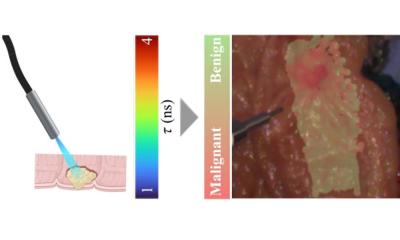News • Early detection of colon cancer
When is the right time for the follow-up colonoscopy?
For the early detection of colorectal cancer, patients with statutory health insurance are entitled to two colonoscopies. If the first examination does not reveal any abnormal findings, a follow-up after a period of ten years is recommended.
Scientists at the German Cancer Research Center are now systematically investigating when and how often tissue lesions are detected during the follow up colonoscopy. Their conclusion: The ten-year period is usually reasonable. It is not yet possible to say whether and for which group of people the follow-up colonoscopy can be postponed even further.
The researchers published their findings in the British Medical Journal (BMJ).

For the early detection of colorectal cancer, patients with statutory health insurance from the age of 50 are entitled to an annual test for hidden blood in the stool. The probability of falling ill with colon cancer increases with age. Therefore, men from the age of 50 and women from the age of 55 are offered a colonoscopy. It is more reliable than the stool test and cancer precursors can be removed immediately. If a first colonoscopy does not reveal any abnormal findings, the guidelines for colon cancer prevention recommend a second examination after a period of ten years.
However, this ten-year interval has so far been determined mainly by observing the growth rates of colorectal cancer precursors or by evaluating data from cancer registries. "What has been missing so far is a systematic examination of the detection rates of relevant findings in follow-up colonoscopy in order to determine after what period of time a follow-up examination should be recommended," says Hermann Brenner from the German Cancer Research Center.
His team therefore carried out a so-called meta-analysis: Thomas Heisser, first author of the current study, and his colleagues summarized the results of 28 different published individual studies that had determined the occurrence of intestinal lesions one to five years (17 studies), five to ten years (16 studies) and ten and more years (three studies) after first colonoscopy.
The scientists first recorded the occurrence of all types of intestinal lesions: In 20.7 percent of all subjects whose first colonoscopy was one to five years ago, lesions were detected during the second examination. If 5 to 10 years had passed since the first examination, the detection rate was 23 percent, after more than ten years 21.9 percent.
It makes sense to only advise an earlier follow-up examination in special cases, e.g. in cases of increased risk due to a family history
Herrmann Brenner
If, on the other hand, the scientists only looked at the clinically much more relevant advanced precursors, the detection rates were 2.8 percent after one to five years, 3.2 percent after five to ten years and 7 percent after more than ten years. "The comparatively high rate of small lesions found only a few years after the first colonoscopy can probably be largely explained by the fact that very small precursors were not detected or removed during the initial examination," says Hermann Brenner. "This is also indicated by the fact that this rate hardly increases any further in the following interval.
The rate of advanced cancer precursors is much more important for prevention. Up to ten years after the initial examination, it remains at an almost equally low level of 2.8 percent and 3.2 percent respectively. "This means that during a follow-up colonoscopy in the first ten years after an inconspicuous colonoscopy only very rarely relevant findings would be found. It therefore makes sense to only advise an earlier follow-up examination in special cases, e.g. in cases of increased risk due to a family history."
According to the authors, the data available is still too thin for statements on whether the second colonoscopy can possibly be postponed for more than ten years in people without known special risks. Here the scientists could access only three studies. "These studies also included people whose initial examination was sometimes considerably longer than ten years ago. However, larger examinations are necessary in order to determine whether the detection rate is still justifiably low 12 or 15 years after the initial colonoscopy," says Herrmann Brenner.
Source: German Cancer Research Center (DKFZ)
14.12.2019





